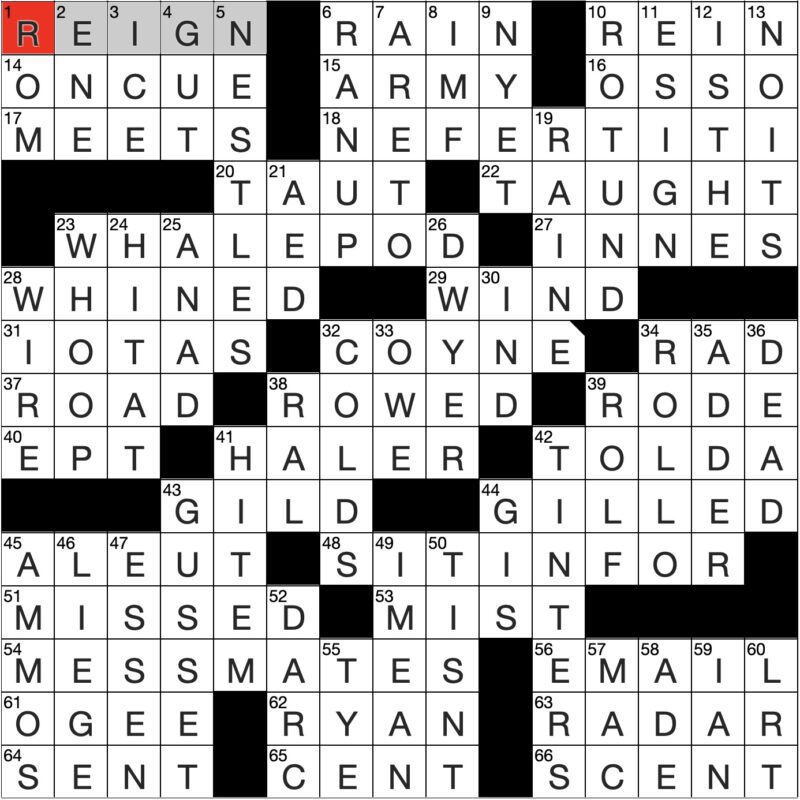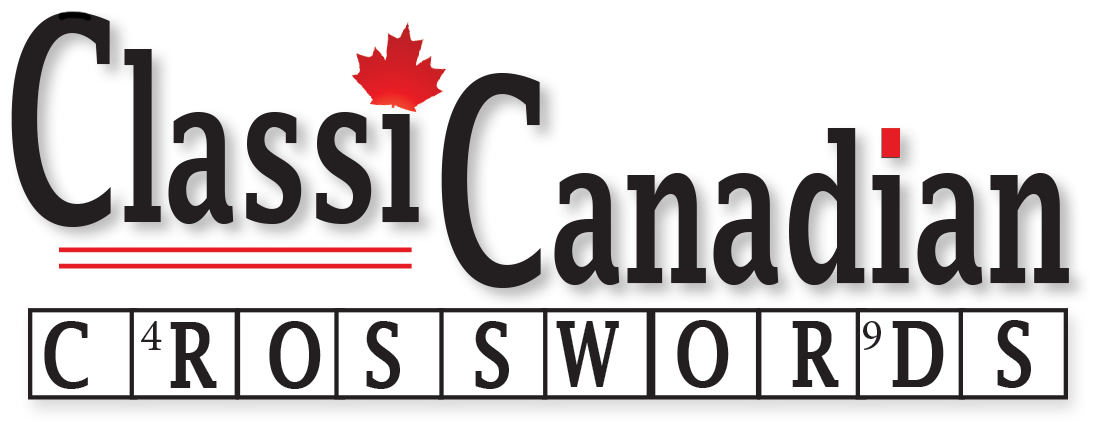Well, the oyster festival last Thursday was fantastic, and Saturday’s boat tour went well, both with fine weather. We have a bit of rain today, but we need it and it should clear up for the weekend, though it’s supposed to be cooler – more seasonal, actually as it has been unusually (but pleasantly) mild the last week or so. I was hoping the Blue Jays would knock off the (despised) Yankees last night, but hopefully they’ll get them tonight. If the Mariners are successful against the Tigers, a Seattle-Toronto match-up for the American League Championship Series would be great, but I’d likely be rooting for Seattle, not out of national loyalty, but I consider the Seattle area my second home. In any event, I want to see a Brewers-Mariners World Series, as neither have ever won it. That wraps up the baseball postseason report, now back to our regularly scheduled crossword puzzle.
- Name: Echo Location
- Grid size: 15×15
- Entries: 80
- Difficulty: Very Hard (my solve time: 11:16)

I wasn’t sure what to expect from “Echo Location” – it’s usually spelled echolocation, which is active sonar used by several animals (bats, dolphins, whales) to navigate and locate prey. However, in this puzzle it’s used to “echo” the sounds of words with other words – the themers are sets of 2 or 3 words, where the first is defined straight, and the subsequent entries are defined as a homophone of the others:
- 1A: [Rule]: REIGN & 6A: [Homophone of 1- and 10-Across]: RAIN & 10A: [Homophone of 1- and 6-Across]: REIN – Reign is the rule of a monarch; rain is liquid precipitation, and a rein is a strap used to check or guide a horse.
- 20A: [Not slack]: TAUT & 22A: [Homophone of 20-Across]: TAUGHT – A taut rope is one under strain or tension; to be taught is to learn something from someone.
- 28A: [Acted peevishly]: WHINED & 29A: [Homophone of 28-Across]: WIND – We used to poke fun at the aviators on our ship with the joke “Q: What’s the difference between a pilot and their helicopter? A: The helicopter stops whining once it’s on the ground.” That was one way to wind them up.
- 37A: [Frost’s was “less travelled by”]: ROAD & 38A: [Homophone of 37- and 39-Across]: ROWED & 39A: [Homophone of 37- and 38-Across]: RODE – “The Road Not Taken” is a classic poem by Robert Frost; a boat or scull is propelled by rowing it, and rode can be that past tense of ride or the anchor system that connects a vessel to the seafloor.
- 43A: [Coat in fancy metal]: GILD & 44A: [Homophone of 43-Across]: GILLED – This was probably the most obscure of all the word “echoes.” To gild something is to coat it in a thin layer of precious metal, usually gold or silver. Gilled is used to refer to a creature that has gills, such as a fish, or the act of gutting or catching a fish by the gills.
- 51A: [Was off target]: MISSED & 53A: [Homophone of 51-Across]: MIST – I’m off Target myself but I doubt I’m missed. Lots of connections and cross-references in this puzzle – mist is a form of precipitation, like rain from 6A.
- 64A: [Shipped]: SENT & 65A: [Homophone of 64- and 66-Across]: CENT & 66A: [Homophone of 64- and 65-Across]: SCENT – Sent is the past tense of send, a cent is a hundredth of a unit of currency such as a dollar or euro, and a scent is a smell, usually pleasant (as opposed to an odor).
Wow – lots of themers! I think this theme was a fun one – see this week’s quote for more fun with homophones. The puzzle was really well constructed and the theme helped with the solve. Having said that, I didn’t end up with a clean solve. There was a tough (for me) triple natick at 19D/27A, 19D/32A, and 26D/32A – ouch. The crux of it was not having any idea who 19D and 32A are – I have a hunch we’ll be learning more about them in Canadian content below… In any event, I spent several minutes trying to find any errors, and then running the alphabet to try to get the 26D/32A cross, but it turns out I had the last letter of 19D incorrect. A few other minor snags slowed me down as well; I’ll flag any of interest in Other stuff below.
Canadian content:
- 1D: [Queen’s Park Gallery in T.O.]: ROM – The Royal Ontario Museum is “home to 18 million artworks, artifacts, and specimens from around the world and across the ages.”
- 19D: [Our Lady Peace singer Maida (and a bonus homophone of 1-Across)]: RAINE – Raine Maida was born in Toronto, and is the lead vocalist for Our Lady Peace. He has also appeared in several films, including “Armageddon” and “The Sisterhood of the Traveling Pants.”
- 32A: [CBC TV’s “At Issue” regular Andrew]: COYNE – Andrew Coyne, a columnist for The Globe and Mail who was raised in Winnipeg, is a regular participant on the weekly CBC podcast “At Issue.”
- 57D: [Fort ___ (Alberta oil city, casually)]: MAC – Fort McMurray is located in northeast Alberta, in the middle of the Athabasca oil sands, the existance of which were first recorded in writing in 1778. It has played a significant role in the development of the national petroleum industry.
- 60D: [Calgary’s C-Train syst., e.g.]: LRT – Calgary Transit operates the C-Train, which is an example of light rail transit.
- 62A: [Reynolds voted People’s “Sexiest Man Alive” in 2010]: RYAN – Ryan Reynolds was born in Vancouver, and is best known for the “Deadpool” films.
Other stuff:
- 23D: [No big ___ (nothing special)]: WHOOP – lol – I can tell Barb and I are of the same generation – I haven’t heard “no big whoop” in [REDACTED] years.
- 43D: [Garment insert]: GUSSET– No idea why, but this one came right to me. A gusset is a piece of material sewn into a garment to strengthen or enlarge a part of it, such as the collar of a shirt or the crotch of an undergarment. Now I know where I remembered it – a gusset plate is used in construction and shipbuilding to hold metal structural members together.
- 48A: [Take the place of]: SIT IN FOR – I confidently entered “IN LIEU OF” which worked with a couple of crosses so it stayed in there for way too long.
Quote of the week:
If ewe due naught no watt a homophone is, eye well X plane. Homophones R words, that win herd, sound the same, butt R naught spelt the same and mien differ rent things. Watt eye yam saying hear is that the English language ran out of words and had two reuse a phew. If some one is reading this too ewe rite now than it mite seam grate, butt just no that the purse son who reeds this is half-ing a reel pane full thyme. If ewe half know clew how two spell some thing and you’re teacher tells ewe two spell it buy “sounding it out,” ask hymn ab out home a phones, cause if the “sound ding it out” method was a hole lot moor ack U rate oar bet her than guess sing, wood home F owns X cyst? Ewe sea, hoe Moe phones own Lee X cyst sew you’re tea chair has a ree sun too mark down you’re pay purse. All so sew ewe sound like ewe half Ben drink king when ewe send text mess ages you sing voice two text. Two bee fare, English spell ling never maid much scents too beg in with.”
― James Rallison, The Odd 1s Out: The First Sequel
